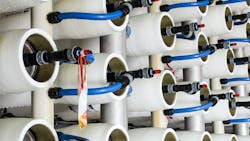Lessons in future-proofing water supplies through desalination
Israel is a world leader in desalination technology and has made significant advances in the field over the years. IDE Technologies, an Israeli water treatment company, has played a key role in this development and has gained a reputation for its desalination solutions.
IDE Technologies was founded in 1965 and has since become a significant player in the desalination industry. The company has been involved in many high-profile projects worldwide, including Ashkelon, Hadera, Sorek 1, Sorek 2, and now the Western Galilei desalination plants in Israel, which are currently among the largest desalination plants in the world.
Overcoming regional water scarcity
The success of IDE would not be possible without the specific challenges in the state of Israel. Israel has been suffering from water scarcity since its early days, and some might say that the water crisis in this region goes back as far as biblical times. In modern times, recurring droughts and natural population growth, which ascended from 1.85 million people in 1945 to almost 10 million people today, have made water even scarcer.
Israel took several measures to overcome this constant water shortage, such as recycling water for agriculture and using special droppers for field irrigation. Some seawater desalination was also used but on a low scale. Until 2000, seawater desalination’s capital and operational costs were very high due to the prices of reverse osmosis (RO) membranes and energy.
Two main game changers shifted the attitude of the Israeli government in favor of seawater desalination. The first was the significant reduction in the cost of the polymeric membrane, from $1,000 in the mid 90’s to less than $500 at the end of the decade. The second was the discovery of a vast natural gas reservoirs off the coast of Israel. The most well-known is the TAMAR Natural gas reservoir, with an estimated 10.9 trillion meter-cube of gas. This allowed the government of Israel to launch an ambitious plan to solve the Israeli water problem by building mega desalination plants along the coast of Israel, which would supply all the drinking water Israel needs.
During the last 23 years, IDE won five of the seven bids the government of Israel published. To win such a high number of bids, IDE developed a holistic strategy, which started with recruiting engineers and assembling teams of analysts, economists and legal personnel who can forecast the future costs of different dependencies such as energy and building labor, among other things. This was important in order to propose a winning bid with the proper escalations to sustain long-term profitable seawater desalination plants.
Lessons learned
One of the critical lessons that IDE learned about future-proofing water supplies through desalination is the importance of innovation and continuous improvement. The company invested in research and development and has constantly sought to improve its technologies and processes to increase efficiency, reduce costs, and enhance the quality of its water output.
One of the first lessons was the design of large-scale plants. The size of the plants is a challenge on the one hand. Still, on the other hand, it opens a range of improvement opportunities. Some of the improvements were incorporated in the first mega desalination plant in Ashkelon that was commissioned in 2004, such as the pressure center that replaced the pump concept for each RO train with several big pumps.
The advantage is in the higher efficiency of the pumps, which gave leverage increment of 2% efficiency. Another improvement was the eight membranes instead of seven membranes inside a pressure vessel, allowing IDE to offer lower Capex. Last but not least is the removal of Boron by a cascading of four stages of brackish water reverse osmosis (BWRO) seawater reverse osmosis.
These were the first generation of improvements, and over time a second generation of improvements was implemented in the design of the mega plants, which were the modular design of the SWRO and the BWRO units.
The concept of cutting the installation costs onsite was implemented not only in mega plants but in all of IDE’s plants worldwide since 2016. The development of membrane technologies allowed a unique offering of two different types of membranes inside a pressure vessel. This had a considerable impact on the ability of IDE to offer desalination plants with low specific energy (SE).
IDE also has proposed out-of-the-box solutions, such as in Sorek 1 in 2009 with the 16-inch pressure vessels instead of an 8-inch vessel. This allowed a reduction in the number of pressure vessels by 76%. Additionally, IDE’s design for Sorek 2 offered a new concept: instead of an electric drive for the high-pressure pumps, it used steam turbines that replace the electric drives, allowing up to 8% savings in energy costs, which became a compelling advantage for project stakeholders in choosing IDE over the competition.
An important lesson for the government of Israel is the need for a holistic approach to water management. Overall, Israel and IDE Technologies have demonstrated that desalination can be a viable and effective solution for meeting the world’s growing water needs, while showing it is essential to approach the issue thoughtfully and strategically to ensure long-term success.
Desalination alone cannot solve all the water problems, so it is also essential to consider a range of solutions, including water conservation, wastewater reuse and rainwater harvesting to ensure a sustainable water supply for the future.



